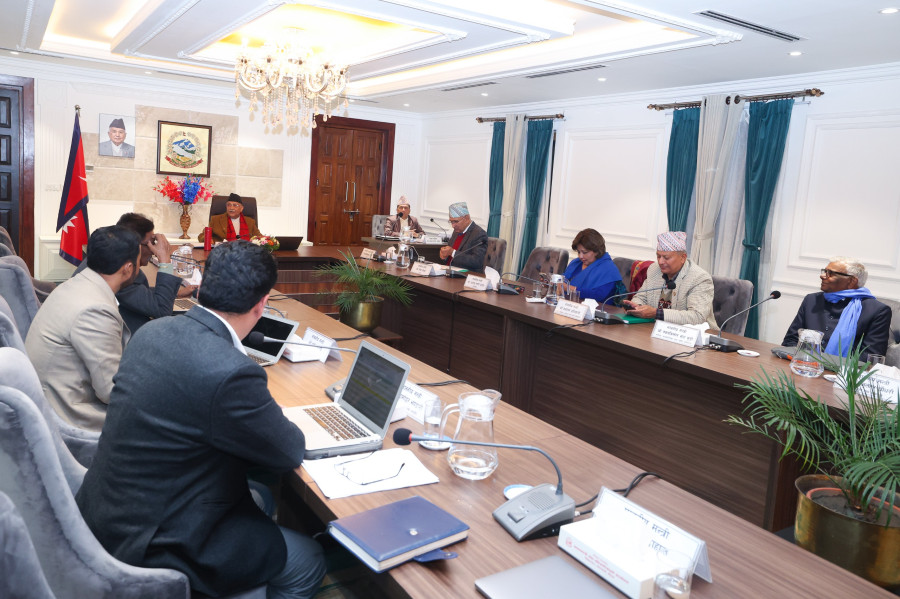Politics
Opposition cries foul as Cabinet passes 5 ordinances
Many lawmakers have termed the government’s decision to bypass Parliament to amend laws ‘regressive’.
Post Report
The government on Friday night decided to issue five ordinances to amend some Acts and to relax some provisions related to information technology, land purchase, foreign investment, and service delivery.
Opposition parties have slammed the decision to issue the ordinances by bypassing Parliament. Prior to the Cabinet meeting that took the decision, Prime Minister KP Sharma Oli had reached Sheetal Niwas to meet President Ramchandra Paudel. He had briefed the head of state on the contents of the new ordinances.
The first ordinance is on “Promotion of good governance and easing the public service”. Under this, the government will amend at least 12 existing laws.
The second ordinance is on “Improving the economic and business environment and investment promotion,” whereby the government will change some legal provisions. The third one is on changing the name of “Investment Act” to “Public Enterprise and Public Investment Management Act,” according to officials privy to the matter.
The fourth ordinance is on “Working procedure for economic and financial accountability”. Likewise, the fifth one is an amendment to the Land Act.
As per the recommendation made by a task force led by former chief secretary Leeladevi Gadtaula, the government has decided to make changes in several existing laws through the ordinances. Representing the ruling Nepali Congress and CPN-UML parties, the taskforce members were Semanta Dahal, Pratap Poudel, Kedar Koirala, Rajendra Ghimire and Arun Poudel.
Opposition lawmakers criticised the government decision to issue the ordinances at midnight by bypassing Parliament.
CPN (Maoist Centre) Vice-chairperson Phampa Bhusal expressed her reservations. “This decision not to convene Parliament and get laws passed through ordinances is a regressive move,” she said.
“The country is reeling under corruption, inflation and unemployment. But the government does not summon the House to frame the required laws. Meanwhile, the prime minister convened the Cabinet in Baluwatar [his private quarters]—not Singha Durbar [the secretariat]—at midnight and decided to bring the ordinances,” Bhusal said.
The government says it has the constitutional right to bring the ordinances. “We cannot promptly endorse the bills from the House after tabling them,” said Prithvi Subba Gurung, the government spokesperson. “That is why we decided to introduce the ordinances. Parliament’s session will be called soon.”
Defending the ordinances, Pradeep Gyawali, deputy general secretary of the UML, highlighted the key features of the ordinances in 17 different points. According to him, through the ordinances, the government aims to reform laws so that the concerned would face action if a file is stuck in government offices for more than a week.
The government has likewise decided to adopt legal provisions to use Nagarik App for better service delivery, implement ten-year free visa facility for Non-resident Nepalis who have obtained the non-resident Nepali citizenship, and increase the retirement age of civil servants from 58 to 60.
Likewise, the property of those convicted of grave crimes will be confiscated, changes will be made in provisions for verdict implementation, and national ID will be made compulsory for social security schemes.
According to Gyawali, the government has changed some provisions related to legal fines and bail, changed the law to institute the Yogmaya University, as well as tweaked legal provisions to allow Nepali IT companies to invest abroad, bring their incomes to Nepal and to allow them to open branches in a foreign country. Those who have obtained non-resident Nepali citizenship will be allowed to set up companies in Nepal.
Some existing provisions related to revenue dispute and leakage will also be changed, and there is a new provision of fast-tracking arbitration if a contractor lands in a dispute.
There will be clear arrangements for sale of shares received by a company's employees, the red tape while registering offices is being cut down, and both service and manufacturing industries are being allowed to operate inside special economic zones (SEZ).
Amendments to various laws have been made with the goal of fostering a more favourable business environment, said Semanta Dahal, a member of the taskforce. Several recommendations from the private sector were taken into consideration in the process.
Former education minister and Rastriya Swatantra Party lawmaker Sumana Shrestha expressed her reservations over the content of the ordinances and raised several questions.
“Of course, we need reforms in many laws for good governance and service delivery, but the authoritarian ‘ordinance rule’ that is implemented by sidelining parliamentarians, and suppressing the voices of the people and their representatives is unacceptable to us,” she wrote in a long post on the social media platform X.
The Non-Resident Nepali Act is in force. The economic rights of non-resident Nepalis are guaranteed in the constitution. What contribution can the ordinance, which has left out necessary regulations and procedures to exercise those rights, make except besides ‘newsmaking’? Shrestha asked.
The facilitation and reform promised to the Nepali IT companies in the budget for the current fiscal year has not been implemented. “Good governance can be established not by adding laws but by solving the problems in implementing the existing ones,” Shrestha wrote.
Rastriya Prajatantra Party Chairman Rajendra Lingden also opposed the ordinances and called it a move towards totalitarianism. “The government’s bad intent has been exposed and we will raise this issue in Parliament,” said Lingden.
Ruling party leaders have supported the ordinances though. “The government decided to issue some ordinances to bring about swift economic growth and progress,” Home Minister Ramesh Lekhak said at a function in Kathmandu on Saturday.




 14.29°C Kathmandu
14.29°C Kathmandu














